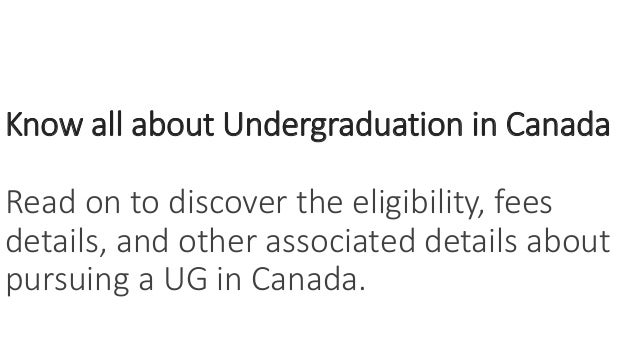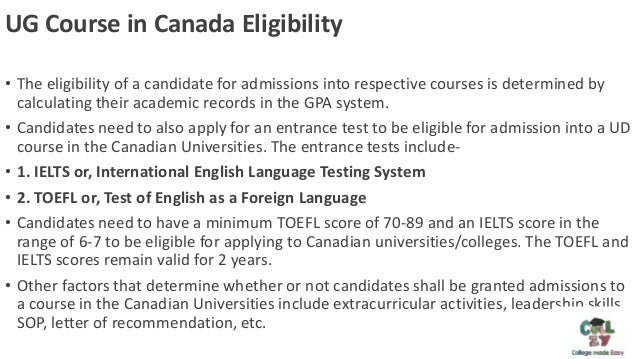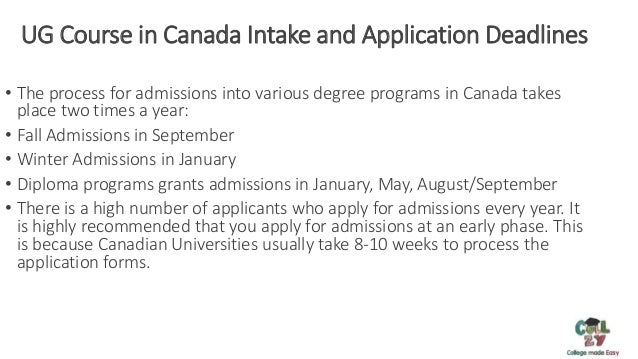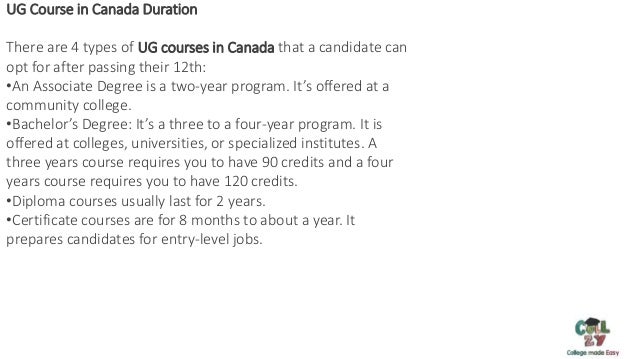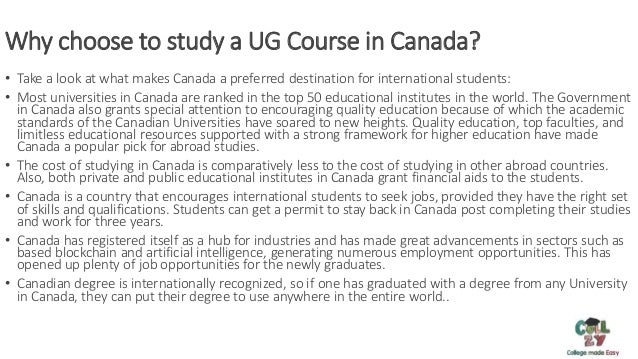Know all about pursuing undergraduation in canada.pptx
- 1. Know all about Undergraduation in Canada Read on to discover the eligibility, fees details, and other associated details about pursuing a UG in Canada.
- 2. UG Course in Canada Eligibility ŌĆó The eligibility of a candidate for admissions into respective courses is determined by calculating their academic records in the GPA system. ŌĆó Candidates need to also apply for an entrance test to be eligible for admission into a UD course in the Canadian Universities. The entrance tests include- ŌĆó 1. IELTS or, International English Language Testing System ŌĆó 2. TOEFL or, Test of English as a Foreign Language ŌĆó Candidates need to have a minimum TOEFL score of 70-89 and an IELTS score in the range of 6-7 to be eligible for applying to Canadian universities/colleges. The TOEFL and IELTS scores remain valid for 2 years. ŌĆó Other factors that determine whether or not candidates shall be granted admissions to a course in the Canadian Universities include extracurricular activities, leadership skills, SOP, letter of recommendation, etc.
- 3. UG Course in Canada Intake and Application Deadlines ŌĆó The process for admissions into various degree programs in Canada takes place two times a year: ŌĆó Fall Admissions in September ŌĆó Winter Admissions in January ŌĆó Diploma programs grants admissions in January, May, August/September ŌĆó There is a high number of applicants who apply for admissions every year. It is highly recommended that you apply for admissions at an early phase. This is because Canadian Universities usually take 8-10 weeks to process the application forms.
- 4. MS in Australia Important Documents: UG Course in Canada Duration There are 4 types of UG courses in Canada that a candidate can opt for after passing their 12th: ŌĆóAn Associate Degree is a two-year program. ItŌĆÖs offered at a community college. ŌĆóBachelorŌĆÖs Degree: ItŌĆÖs a three to a four-year program. It is offered at colleges, universities, or specialized institutes. A three years course requires you to have 90 credits and a four years course requires you to have 120 credits. ŌĆóDiploma courses usually last for 2 years. ŌĆóCertificate courses are for 8 months to about a year. It prepares candidates for entry-level jobs.
- 5. Why choose to study a UG Course in Canada? ŌĆó Take a look at what makes Canada a preferred destination for international students: ŌĆó Most universities in Canada are ranked in the top 50 educational institutes in the world. The Government in Canada also grants special attention to encouraging quality education because of which the academic standards of the Canadian Universities have soared to new heights. Quality education, top faculties, and limitless educational resources supported with a strong framework for higher education have made Canada a popular pick for abroad studies. ŌĆó The cost of studying in Canada is comparatively less to the cost of studying in other abroad countries. Also, both private and public educational institutes in Canada grant financial aids to the students. ŌĆó Canada is a country that encourages international students to seek jobs, provided they have the right set of skills and qualifications. Students can get a permit to stay back in Canada post completing their studies and work for three years. ŌĆó Canada has registered itself as a hub for industries and has made great advancements in sectors such as based blockchain and artificial intelligence, generating numerous employment opportunities. This has opened up plenty of job opportunities for the newly graduates. ŌĆó Canadian degree is internationally recognized, so if one has graduated with a degree from any University in Canada, they can put their degree to use anywhere in the entire world..
- 6. To know about College Admissions in these colleges and more Information like this make sure to visit our site . ŌĆó Website : https://collzy.com/ ŌĆó Facebook : https://www.facebook.com/collzyedu ŌĆó Twitter : https://twitter.com/CollzyEdu ŌĆó Linkedin : https://www.linkedin.com/company/65413733/ ŌĆó Instagram : https://www.instagram.com/collzy_official/

